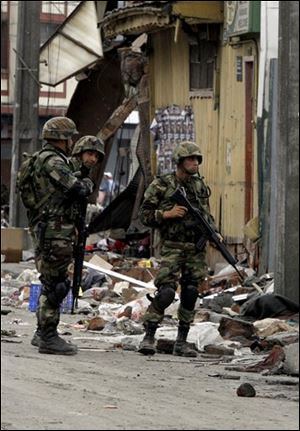
Chile troops, police attack post-quake looting
3/1/2010
Soldiers stand guard in the streets of Talcahuano, Chile, Sunday, Feb. 28, 2010. A devastating earthquake struck Chile early Saturday Feb. 27, 2010 knocking out power and closing most businesses.
CONCEPCION, Chile — Rescuers found signs of life in a quake-toppled building on Monday as the world offered aid to victims of a catastrophe that killed more than 700 people. Troops and police cracking down on looters arrested dozens of people for violating a curfew.
"We are confronting an emergency without parallel in Chile's history," Bachelet declared Sunday, a day after the magnitude-8.8 quake — one of the biggest in centuries — killed at least 708 people and destroyed or badly damaged 500,000 homes.
Some coastal towns were almost obliterated, first shaken by the quake, then slammed by a tsunami that lifted whole houses and carried them inland and that reduced others to piles of sticks.
Across the highway from a looted supermarket in Concepcion, the big city closest to the epicenter, rescuers heard the knock of trapped victims inside a toppled 70-unit apartment building began to drill holes through thick walls trying to reach them, said fire department Commander Juan Carlos Subercaseux.
Firefighters had already pulled 25 survivors from the building, as well as eight people who died.
Only the chop of military helicopters flying overhead broke the silence demanded by rescuers straining to hear signs of life within the building.
Police chief Eliecer Soler said officers arrested 55 people for violating a curfew imposed after looters sacked nearly market in town. Troops ordered into the city by Bachelet began to patrol to enforce security.
At least a few looters re-emerged to rob a market on Monday despite Bachelet's order placing the city's security under military command.
On Sunday, ingenious looters used long tubes of bamboo and plastic to siphon gasoline from underground tanks at a closed gasoline station.
Eduardo Aundez, a Spanish professor, watched with disgust as a soldier patiently waited for looters to rummage through a downtown store, then lobbed two tear gas canisters into the rubble to get them out.
"I feel abandoned" by authorities, he said. "We believe the government didn't take the necessary measures in time, and now supplies of food and water are going to be much more complicated."
The U.N. said Monday that it would begin rushing aid deliveries to Chile following Bachelet's announcement she was seeking international aid.
U.N. humanitarian spokeswoman Elisabeth Byrs said Chile was seeking temporary bridges, field hospitals, satellite phones, electric generators, damage assessment teams, water purification systems, field kitchens and dialysis centers.
"We are prepared to provide assistance," Byrs told The Associated Press in Geneva. "It could be quite fast, given that our experts are on standby and were alerted in the region."
U.S. Secretary of State Hillary Rodham Clinton also offered to work "in solidarity" with Chile's leaders to provide disaster aid. Speaking to reporters while traveling in Uruguay, Clinton said she would bring some communications equipment when she visits Chile on Tuesday.
Argentina, meanwhile, announced it was already sending its neighboring nation six aircraft loaded with a field hospital, 55 doctors and water treatment plants.
Bachelet ordered troops to help deliver food, water and blankets and clear rubble from roads, and she urged power companies to restore service first to hospitals, health clinics and shelters. Field hospitals were planned for hard-hit Concepcion, Talca and Curico.
Bachelet also ordered authorities to quickly identify the dead and return them to their families to ensure "the dignified burials that they deserve."
Defense Minister Francisco Vidal acknowledged the navy made a mistake by not immediately activating a tsunami warning after the quake hit before dawn Saturday. Port captains in several coastal towns did, saving what Vidal called hundreds of lives.
Thirty minutes passed between the quake and a wave that inundated coastal towns, leaving behind sticks, scraps of metal and masonry houses ripped in two. A beachside carnival in the village of Lloca was swamped in the tsunami. A carousel was twisted on its side and a Ferris wheel rose above the muddy wreckage.
Officials said at least eight people died and eight were missing on Robinson Crusoe Island, where it the tsunami drove the sea almost 2 miles (3 kilometers) into the town of San Juan Bautista.
Efforts to determine the full scope of destruction were undermined by an endless string of terrifying aftershocks that turned more buildings into rubble — and forced thousands to set up tents in parks and grassy highway medians.
"If you're inside your house, the furniture moves," said Monica Aviles, pulling a shawl around her shoulders to ward off the cold as she sat next to a fire across the street from her apartment building.
As if to punctuate her fear, an aftershock set off shuddering and groaning sounds for blocks around.
"That's why we're here," she said.
In Washington, the State Department urged Americans to avoid tourist and other nonessential travel to Chile. U.S. citizens in Chile were asked to contact family and friends in the United States, whether by telephone, Internet or cell-phone text messaging.